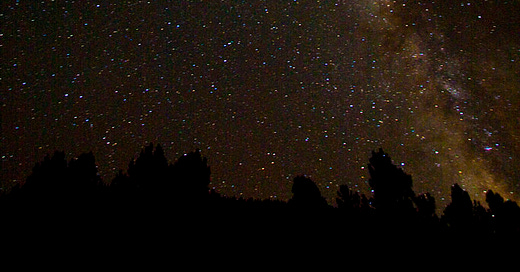We finished our school year a couple of weeks ago, and I’m already deep into summer brain. Backpacking, novel research, house repairs, eating fruit. Sundresses and farmers markets and bicycles. It’s an essential part of the teaching year, the part that fills the sponge so I have full creativity and enthusiasm in the classroom. It makes teaching sustainably joyful.
Speaking of sustainable, I have the goal of getting paid for my time writing this newsletter this year. Thanks to all the paid subscribers who are helping make this happen. I love writing about helping kids love writing, and I really appreciate being supported in that work. So thank you everyone who is able to help make that happen.
Back to the work. Looking back into the dim antiquity of early June, I wanted to write about one of our culminating poetry prompts: Poetry Is. Basically, I told the class that at this point they were poetry experts. Then I told them to write about poetry. They could compare it to anything, and have any opinion of it. I shared some great student poems from one of my favorite poetry teaching books, Poetry Everywhere, where poets compared poetry to cows and chicken pox and their own brains. I think it helped to read some poems that weren’t all roses and sunshine about poems. It gave kids permission to be honest, and equally important, weird.
After we read some examples, we wrote a group poem. I gave everyone a slip of paper and had them start with the stub “Poetry is….” and write one line. Kids who wrote fast could grab another slip of paper.
Then I put them into an order that felt good to me. On a side note, juxtaposition is one of my favorite kinds of meaning-making. Brains are so cool: you put two things next to each other, and our minds draw connections. You don’t have to spell it out.
So I put their lines into an order that felt full of juicy juxtapositions. Then we read them aloud. Here’s the Friday Class’s:
A Poem Can Be
by the Friday Class
A poem is a story that you dream.
A poem can be as big as the universe or small enough to fit in the palm of your hand.
A poem is a rainbow story.
A poem is a conversation heard through a floor.
A poem is pretty.
A poem is like light.
A poem is a tree of light.
A poem is when a leaf falls from the sky.
A poem is a song sung by happy birds in the morning.
A poem is why people’s heartbeats keep beating.
After that, everyone got to write their own poem about poetry. (Poets, incidentally, are always doing this. It even has a name, the Ars Poetica.) I was struck by how many students chose to read these poems in our culminating poetry reading.
(The plays went really well, for anyone waiting for the resolution of that story. Kids took them really seriously, and did a good job acting them with vigor, and felt proud of what they had made. I’m proud too.)
We followed up later by reading the book A Poem That Heals Fish, which is weird in that wonderful French way, and is all about what a poem is.
We also happened (or was this brilliant curriculum planning?) to have my friend Eric Acosta come into class as a visiting poet later in the day where we wrote about poetry. He brought in poems he’d written on bagel bags and floral arrangement paper, poems that were a conversation with a friend, poems that were strange and fresh in ways the kids hadn’t seen yet. They were so ready for it, and so excited about it. Then we drew enormous ribbons of paper from a bag, each one having a phrase Eric wrote on it, and wrote new poems using that phrase.
And so, poetry keeps morphing, or growing, or evading definition, and we keep following it, like Wandering Angus, or like a daydreamer following a daydream.
And suddenly, it’s summer, and students leave, and in the rush some don’t say goodbye, and I’m left to eat summer fruit and dream un-alarm-clocked dreams.
And in the mailbox, a letter from an old student, and in that letter, a poem.




